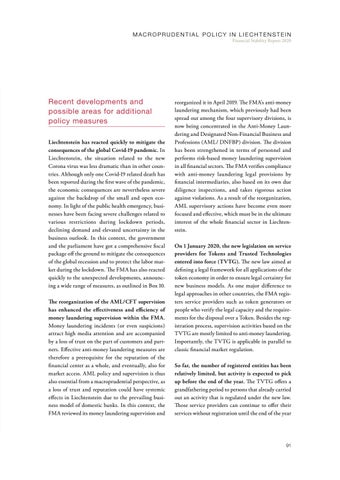M acroprudential policy in L iechtenstein Financial Stability Report 2020
Recent developments and possible areas for additional policy measures Liechtenstein has reacted quickly to mitigate the consequences of the global Covid-19 pandemic. In Liechtenstein, the situation related to the new Corona virus was less dramatic than in other countries. Although only one Covid-19 related death has been reported during the first wave of the pandemic, the economic consequences are nevertheless severe against the backdrop of the small and open eco nomy. In light of the public health emergency, businesses have been facing severe challenges related to various restrictions during lockdown periods, declining demand and elevated uncertainty in the business outlook. In this context, the government and the parliament have got a comprehensive fiscal package off the ground to mitigate the consequences of the global recession and to protect the labor market during the lockdown. The FMA has also reacted quickly to the unexpected developments, announcing a wide range of measures, as outlined in Box 10. The reorganization of the AML / CFT supervision has enhanced the effectiveness and efficiency of money laundering supervision within the FMA. Money laundering incidents ( or even suspicions ) attract high media attention and are accompanied by a loss of trust on the part of customers and partners. Effective anti-money laundering measures are therefore a prerequisite for the reputation of the financial center as a whole, and eventually, also for market access. AML policy and supervision is thus also essential from a macroprudential perspective, as a loss of trust and reputation could have systemic effects in Liechtenstein due to the prevailing business model of domestic banks. In this context, the FMA reviewed its money laundering supervision and
reorganized it in April 2019. The FMA’s anti-money laundering mechanism, which previously had been spread out among the four supervisory divisions, is now being concentrated in the Anti-Money Laundering and Designated Non-Financial Business and Professions ( A ML / DNFBP ) division. The division has been strengthened in terms of personnel and performs risk-based money laundering supervision in all financial sectors. The FMA verifies compliance with anti-money laundering legal provisions by financial intermediaries, also based on its own due diligence inspections, and takes rigorous action against violations. As a result of the reorganization, AML supervisory actions have become even more focused and effective, which must be in the ultimate interest of the whole financial sector in Liechtenstein. On 1 January 2020, the new legislation on service providers for Tokens and Trusted Technologies entered into force ( T VTG ). The new law aimed at defining a legal framework for all applications of the token economy in order to ensure legal certainty for new business models. As one major difference to legal approaches in other countries, the FMA registers service providers such as token generators or people who verify the legal capacity and the requirements for the disposal over a Token. Besides the registration process, supervision activities based on the TVTG are mostly limited to anti-money laundering. Importantly, the TVTG is applicable in parallel to classic financial market regulation. So far, the number of registered entities has been relatively limited, but activity is expected to pick up before the end of the year. The TVTG offers a grandfathering period to persons that already carried out an activity that is regulated under the new law. Those service providers can continue to offer their services without registration until the end of the year
91

